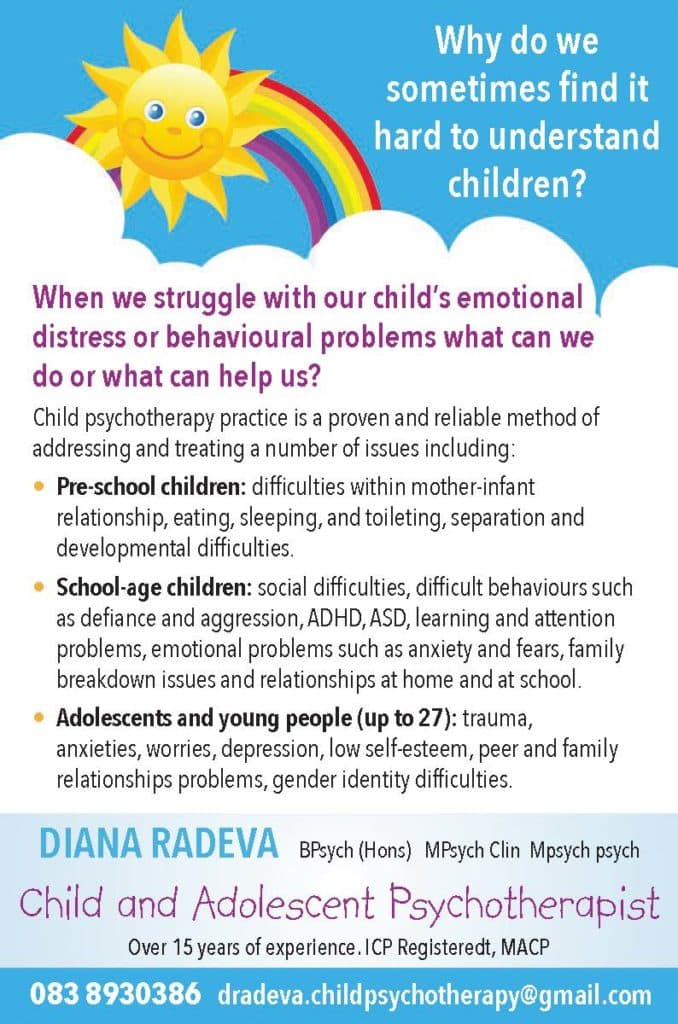In this series of articles (‘Do we understand our child?’) Diana Radeva, child and adolescent psychotherapist sets out to consider the emotional life of children from birth onwards; and how relationships between children and parents evolve over time. It is a view of human growth, which recognises the importance of strong feelings experienced at each stage of development; thus offering ways that parents might find helpful when wanting to better understand their children’s growth.
In the third of the series, Diana looks at the first six weeks.

For most parents – and for most babies as well, the first six weeks are the hardest. After the intense emotions around labour and post-natal care suddenly being alone with a baby could be a daunting experience. It is particularly hard that the times the babies are most frightened and vulnerable, the first few weeks of their lives, is the time when parents are most vulnerable too, at times feeling uncertain whether their baby will really survive and flourish.
A new baby fills up our minds and becomes our whole world. When things are going well, the pride and pleasure are indescribable. When things are difficult, it can feel like the end of the world. It is worth remembering that for most parents these first weeks are extremely hard work, and the ups and downs usually become less extreme as the time passes and the baby becomes more relaxed and easier to understand.
Chaos versus routine
One of the most demanding aspects of a newborn baby is the way in which their life has no structure or predictability. But our ordered world must seem like a chaos to the newborn – new sensations, new smells and atmosphere, and a whole array of new sound and sights. It takes time, and for some babies more time than others before they gradually get used to their new lives and adapt to the expectations we put on them.
Some parents find the lack of routine relatively manageable; while others find it helpful to lead their baby towards a more routine pattern of behaviour during the first weeks. However, it is vital that we reaming open to what our babies are communicating to us, and need us to understand. They ‘will’ be feeling bewildered and lost much of the time, and life will sometimes feel chaotic, frightening and without boundaries. In this situation we must be careful not to lose sight of our own need for stability and time to ourselves as adults.

But of course during these early weeks there are intense moments of pleasure – seeing our babies putting on weight as skinny limbs become soft and round, the warmth of a well-fed baby, early glimpses of smiles. Perhaps most reassuring of all, there are moments when we do get it right, realising with exhilaration that our presence and comfort are exactly what our baby needs.
How the babies’ moods affect the parents
Babies are powerful little creatures with strong personalities, and their own intense emotional states strongly affect the feelings and moods of those caring for them.
The extreme states of mind that the baby has to cope with are not far away from the feelings a mother can be facing alongside her baby. As first-time parents we can often feel that we have been plunged into an alien and rather terrifying world, where we have to learn our way around with amazing speed in order not to get lost. Babies bring turbulence with them and the urgency of their terror can be so powerful that we can feel that we have lost our bearings completely. Strong childlike feelings about our own parents can make a surprise reappearance when we become parents ourselves. Such states are not only inevitable but part of what we are going through – they can also make us particularly well placed to empathise with our babies and remain in touch with their intense emotions and neediness.
Coping with dependency
As new parents we often gripped by a fear that out baby’s crying, sleeplessness, colic or absolute dependency are never going to stop. Over time we discover that things do get easier.
But how does a newborn baby know – and how do first-time parents really know – that each phase will not last forever? Often in the first six weeks we might feel a rather strong anxiety about letting small babies become too dependent on a certain thing – sleeping in the parents’ bed, feeding on demand, dummies, being picked up each time they cry, or being allowed to fall asleep at breast or bottle – in case such things get set in stone. This kind of anxiety stems from a belief that the babies’ needs are endless and will never change. In fact this is not true. The baby might believe it and feel it so strongly, that they can even convince us at times. But we can help them learn otherwise, if we work hard at keeping our adult perspective.
If a baby gets their reassurance from a particular thing – letting them have that as much as you reasonably can, helps them see that the world is a safe enough place, where comfort generally comes when you need it. With enough of these good experiences a baby will begin to feel more comfortable inside and stronger in their own skin.
Although it is not always easy to stay in touch with such neediness, it is important that we keep trying, and not to lose sight of how tiny and vulnerable a baby is. Through responding to the urgency of their needs when they are most helpless, we are paving the way for them to learn gradually enjoy a bit more variety in life and cope with small doses of frustration.
By the end of the first six weeks, the utter helplessness of the newborn has usually been replaced by a more robust baby, more aware of its surrounding and more able to relax and enjoy. Most mothers are feeling a bit more ready to venture out in the world; the chaos is beginning to take some shape.
Once the baby has begun to hold his head up a little, can recognise his parents and feeding time, enjoying both the food and the company, knowing that they belong to him and that he belongs to the world – then for many parents the joy and excitement of getting to know and love this growing baby, and being known and loved in return, really begin.





